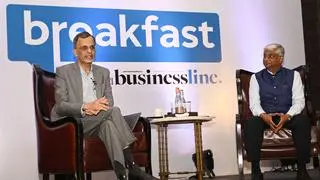A leading website for Indian music is headquartered in the US. It distributes popular Indian songs to over 100 countries and owns the rights to millions of Indian soundtracks.
But the country that has the largest number of its consumers — India — cannot tax the company since it does not have a permanent establishment here.
The story is similar with some of the popular sites that sell goods in India or offer services such as free downloads of music and games.
These companies escape tax by not having a permanent establishment in India. To partly address this issue, the Finance Bill had proposed an equalisation levy of 6 per cent of the gross value of consideration paid for ‘specified services’ to a non-resident who does not have a permanent establishment in India.
The Finance Bill however talked only about online advertisement and digital advertising and other ‘specified services’ as notified by the Centre from time to time. By limiting the ambit to transactions above ₹1 lakh, B2C transactions were left out of the Budget proposal.
This was in line with the recommendation of the BEPS (Base Erosion and Profit Shifting) Action Plan 1 that dealt with problems faced by tax authorities world-wide in taxing digital companies.
The reach But the Committee on Taxation of E-Commerce formed by the CBDT (Central Board of Direct Taxes) has proposed expanding the ambits of this levy considerably, covering a wide gamut of transactions. The Committee has recommended including online marketing and advertisements, cloud computing, website designing hosting and maintenance, digital space, digital platforms for sale of goods and services, and online use or download of software and applications in the equalisation levy.
It is clear that the Income Tax Department is primarily targeting companies such as Google, Amazon and Facebook, the most popular platforms where e-commerce companies advertise their products.
Impact The report quotes a research conducted by octane.in to give some interesting statistics.
“50 per cent of respondents share that e-marketing activities are contributing to more than 10 per cent share of their revenues, social media updates was the top choice for achieving maximum customer engagement (46 per cent) followed by email campaigns (28 per cent). Social media (66 per cent) also topped the list of marketing activities planned for 2016.”
Urvesh Goel, Founder and CEO, Syberplace.com, thinks the equalisation levy imposed on digital advertising is not fair. “When I advertise in Washington Post or The New York Times, there is no charge, but if I advertise on Facebook or Google there is now a levy of 6 per cent.” He thinks it will not be difficult for companies to circumvent this levy by hosting their business on a server located in a country outside India.
It is not just advertising where Indian e-commerce companies will have to pay an additional 6 per cent. Vishwas Shringi, Founder and CEO Voylla.com, says e-commerce companies also make payment to overseas companies for storing data on cloud and so on. All these payments will now invite the levy. He thinks these additional costs are going to hurt companies.
Expansion The levy is proposed to be expanded over a period of time to other activities such as “online sale of goods or services or collecting online payment.”
This appears to be aimed at companies that are based in other countries but sell goods online through agents based in India or a local partner.
Companies that distribute or give users the right to download online music, movies, games etc without the right to make copies or distribute copies can also be covered by this levy going ahead.
Cloud-computing companies that allow Indian companies to store their data on the cloud could also be covered by the levy.
Other services that will come under the tax include online news, online search, online maps and foreign companies that design, host and maintain websites.
Eventually payments made by all companies for availing services of global e-commerce companies might be included in this levy.
Dipanshu Agarwal, COO, Smartprix.com, an online discovery and price comparison site is however more optimistic and thinks since India is a high-growth market, the growth of e-commerce will not be hurt by this levy.








Comments
Comments have to be in English, and in full sentences. They cannot be abusive or personal. Please abide by our community guidelines for posting your comments.
We have migrated to a new commenting platform. If you are already a registered user of TheHindu Businessline and logged in, you may continue to engage with our articles. If you do not have an account please register and login to post comments. Users can access their older comments by logging into their accounts on Vuukle.